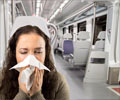Pharmacists can provide key travel health advice on vaccines, medications to carry, and precautions to prevent fever or diarrheal illness in kids.
Highlights:
- International travel for tourism or family visits by immigrants to their native country is rampant these days
- Travel to certain regions such as Africa and Asia is associated with a higher risk of infection and morbidity, especially in children who form a vulnerable group.
- Pharmacists can play a crucial role in giving travel related advice that is specific to the region and based on the risk profile of children.
Travel Boom In The Modern Age
- Global travel has become very common these days be it for tourism purposes, business reasons or immigrants wanting to travel to their native country.
- The world has shrunk because of excellent connectivity between various international destinations and a booming hospitality industry.
- The average spending capacity of persons has also increased and more families plan holidays abroad.
- Many immigrant families and their kids travel to their home country to visit friends and relatives (VFR).
- To give an idea about the huge overseas travel in the present day, more than 70 million Americans traveled abroad in 2015 and nearly 2 million were children.
Why do Children Form A Vulnerable Population?
Though international travel can affect adults and children alike, kids form an especially vulnerable group during such long trips for various reasons.- Children are naturally liable to contract infections easily due to their weak immune system.
- Infants and young children often put their hands and objects into their mouth increasing the risk of transmission.
- Unlike grown-ups, children are not able to communicate what is troubling them and more likely to fall sick.
- Immigrants traveling to their native country often do not take precautions by virtue of having grown there, consequently exposing their kids to risk.
Role of the Pharmacist In Travel Health
Most people embarking on a holiday or trip abroad do not consult a physician for travel related advice. However it is important to consult a qualified and knowledgeable health professional when traveling to certain regions of the world known to have high prevalence of certain diseases and of course to take precautions against diarrheal illnesses which can strike without warning.This is where pharmacists, with their knowledge about drugs and vaccines, can play an important role in advising about travel health.
A visit to the nearest pharmacy will help gain information about region specific disease, whether vaccines are available, medications to carry, and over the counter drugs available for common ailments. Depending on the local regulations, pharmacists can prescribe certain drugs and antibiotics. They can advise them to consult the physician for vaccines or may be able to provide the vaccines in some cases.
As in the case of any consultation, a fee may be applicable.
Common Illnesses Encountered During International Travel
There are several diseases that could occur during long trips. This discussion will be about diarrhea and fevers, the two most frequently encountered conditions during travel, and ways to prevent and treat them.| Illness | Regions Associated | Precautions to take | Treatment |
| Traveler’s diarrhea is caused by agents such as norovirus, rotavirus, Giardia, enterotoxigenic E coli | Asia, Africa, Mexico, the Middle East, and Central and South America |
• Adult supervision of what children eat • Avoid street food Advertisement • Avoid iced drinks Advertisement • Use clean boiled water to reconstitute baby food and formula • Using an alcohol based sanitizer to clean hands regularly will reduce transmission risk |
• Oral rehydration therapy (ORT) available at all medical shops prevents dehydration and saves lives • Anti-diarrheal and drugs for vomiting usually not recommended in children • Antibiotics if approved by a physician |
| Malaria Malaria Mosquito borne illness caused by a protozoan parasite Plasmodium spp | Africa; parts of Asia and South America | Chemoprophylaxis of malaria based on region, age of child, ease of dosing and side-effect profile Protection against mosquito bites, for eg. mosquito nets, clothes to cover arms and legs, and use of repellents with DEET (diethyltoluamide) | May vary depend on age of patient, health condition and region of travel |
| Dengue Dengue Mosquito borne illness caused by a Flavivirus | Tropical and subtropical regions | A vaccine, Dengvaxia (CYD-TDV), has been approved for use in patients aged 9 to 45 years in areas with high prevalence Protection against mosquito bites | No specific treatment. Early diagnosis and symptomatic treatment |
| Typhoid and paratyphoid infections are bacterial infections caused by Salmonella enterica subsp. enterica, serotype Typhi, and serotype Paratyphi | Southern Asia | Safety precautions while consuming food and water as mentioned Strict hand hygiene Typhoid vaccine is available; no vaccine for paratyphoid | Azithromycin, ciprofloxacin, and ceftriaxone advised based on region and resistance. Fluoroquinolones contraindicated in children in some countries; however WHO guidelines recommends its use if benefits outweigh the risks where suitable alternatives may not be available |
In conclusion, pharmacists can potentially bridge the gap between doctors and the public in providing guidance for optimal travel health and referring the public to a specialist where appropriate.
References:
- Malini Ghoshal, Sanjat Kanjilal, Travel-Related Infection in Children: Pretravel Counseling to Reduce Morbidity. (2017) US Pharmacist. 2017;42(4):HS21-HS28
Source-Medindia









